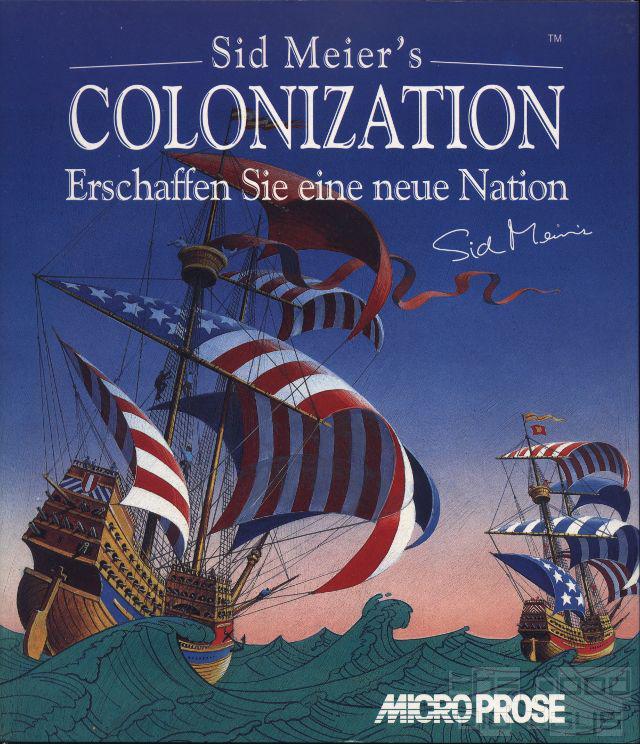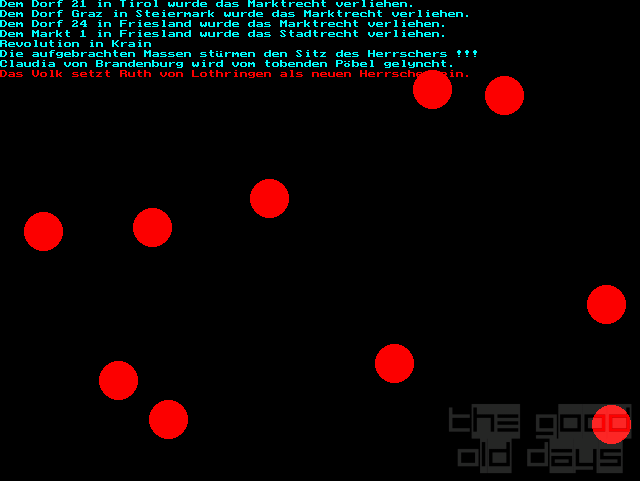Designed by Sid Meier's protégé, Brian Reynolds, Colonization adds a whole new level of strategy to Civilization, a story that has never been reproduced in a turn-based strategy game, and gives a whole new meaning to replay value.
In Colonization, you will play the role of a viceroy of one of four European nations – England, France, Spain or the Dutch, with the goal to establish a colony in the newly discovered New World. Each nation has its own advantage: the English produce more emigrants willing to settle in your colonies, the Spanish enjoy a military bonus when fighting the natives, the French are better diplomats and the Dutch can count of more price stability on domestic markets. This adds a whole new level to the replay value, which was reproduced only much later in Alpha Centauri (also designed by Reynolds).
As you arrive to the New World, you will have a single colonist, a scout and a military unit. Your first task will be to find a suitable place to build your colony, which will exploit up to eight unoccupied spaces around. It is essential to find a good source of food, as well as some source of timber and preferably one or two raw resources. If you are lucky, you will find such a place really quickly, but most likely you will end up close to the natives, who also occupy their eight squares around their camps.
Once you establish a colony, you will be able to place your colonist to one of several positions. He can gather food, cut trees, or work in one of many workshops. To work in those workshops, however, he needs raw materials, which will be scarce at the beginning of the game. In order to build more improvements, somebody will have to cut wood, and somebody else serve as a carpenter to build the improvement. In addition, a farmer will be necessary to feed those two (and himself). As a consequence, at least three people will be necessary to establish a viable colony.
Colonization was maybe the only strategy game to create a great deal of political controversy, especially in Europe. Many politically correct people were disturbed by the fact that the game has completely ignored the issue of slavery. This is also rumored to be the reason why a sequel was never produced.
There are three ways to increase population. The most straightforward but very time-consuming way is to wait till you gather enough food to ?grow? a new colonist. Another, very unreliable method, is to establish religious missions in the surrounding native villages and hope for some converts. Basically, the only viable way will be to wait for new emigrants from the Old World. Whenever you create enough crosses (through churches or preachers), a new emigrant will appear at the pier of your capital, and your transport ship will be able to ferry him over to the new world. The majority of these emigrants will be skilled workers, which automatically add a production bonus when working in their area of expertise ? an expert farmer will generate more food when farming, but very little products when doing something else, for example. From time to time, you will be able to find a bonus with your explorers, which will automatically generate several emigrants at the same time.
Over time, you will encounter other nations. At first, they will graciously allow you to share the newly found continent with them, but over time they'll change their mind and attack you. Thus, it is essential to maintain a strong army. You will be able to equip your immigrants with horses and/or muskets, but the better way (much more expensive) will be to train veteran soldiers. You will be also able to build city fortifications, and buy artillery and better naval units.
In addition to other nations, you will encounter the natives. While initially they will be friendly to you, this changes as your military presence increases, and will attack you later. You can keep destroying their camps, which will yield more land and some money (or very much money when you destroy their capital), but will have an adverse effect on your final score. It is much better to get certain people to the Continental Congress, who will give you certain advantages against the natives (among other things).
The Continental Congress serves as a combination of world wonders, technology improvements and palace from Civilization. Each new member will give you certain advantages, such as the ability to trade with other nations, all native land for free, better diplomatic relations, more production, and more. Every time you progress enough into the game to be awarded a member of the Continental Congress, you will be able to choose one of five people, from each of the major categories: military, exploratory, trade, diplomatic and religious. The advantages you get vary with every person, and are usually important enough for you to strive to build up the congress.
With so many purchases I mentioned, it is apparent that you will heavily depend on income. The game has a very advanced economic system for its time. You will be able to ship any raw materials or finished products back to your homeport and sell them. Over time, the prices will change, depending whether you are selling a certain product or buying it. As the game progresses, you will be able to manufacture your own products, and instead of gathering raw materials around your home cities, you will buy them at home and ship back finished goods. However, over time, your king will increase the taxes on your products. It starts rather low, with one or two percentage points, but will build up to over 50% if you always give way. You can refuse the tax by dumping the entire stockpile of a certain product, which you will then be unable to trade with your home country. This will also raise the rebel sentiment, which is important for the endgame?
The ultimate goal of the game is to declare independence. Rebel sentiment in your colonies will rise over time, and once it grows to over 50%, you will be able to declare independence. Your declaration will be immediately followed by your king sending his elite troops against you and promptly conquering a few of your cities. The game ends when you defeat the king's troops, with the help of one of the other nations, which will supply you with additional troops after several turns.
On the technological front, the game is a mixed back. While the sound is much improved from Civilization, the graphics have experienced no improvement since Civilization three years earlier. They are still the same static figures, only slightly more detailed. The terrain looks a little differently, but the quality is roughly the same. The A.I. is weird, to say at last. On one hand, the A.I. makes some really nifty moves: it attacks your most weakly defended cities (which gets especially cumbersome when you declare independence) or attacks when it can gain certain advantage, such as when you are transporting a huge loot. On the other hand, the A.I. makes some glaring mistakes. A foreign nation can offer to sell you certain units, only to attack the city defended by these units two turns later. Overall, however, the A.I. is better than that in Civilization. On the other hand, the game balance is much worse. There are two main problems I encountered here. The first problem with the balance is the disproportional price system. On one side, the most advanced warship will cost you 5000 gold, on the other, a veteran soldier unit will cost you 2000 gold, which is too much relatively to the ship. The second problem with the balance is the relative difficulty in building colonies with no access to water. In order to trade, you will need to ship goods, and from inland, you will only be able to ship them by wagons. This method is very cumbersome and slow, virtually preventing you from building inland cities, unless there is a very good reason (a high concentration of raw materials) to do so.
Overall, Colonization is to Civilization what Alpha Centauri is to Civilization II. It introduces new concepts, improves the replay value and allows for a very unique experience, while maintaining the same style of play. Despite the weak graphics, unbalanced A.I. and a few rather weird choices by the designer, the game should be in the collection of every serious gamer.


Kommentare (7) [Kommentar schreiben]
Dieses Spiel ist meiner Meinung nach eines der besten rundenstrategiespiele.Durch seinen intressanten geschichtlichen Hintergrund motiviert es den Spieler enorm und bietet so guten langzeitspielspass.
Was mich an dem spiel stört ist die schlechte Gegner KI sowie der öde Kampf gegen die europäeischen Kolonialmächte.
Da diese sich immer gleich verhalten und einfach ihre Truppen wahlos an der Küste absetzen und so leicht zu besiegen sind. (genügend eigene Truppen vorausgesetzt) Weiterhin finde ich das Kampfsystem irreführend da es den anschein hat das die Kämpfe ausgewürfelt werden. Ansonten aber absolut spielenswert!
Kleine Ergaenzung zur fehlenden Originalitaet. Wollen wir doch mal sehen, was Sid Meier für Spiele bis Civilization designed und produziert hat:
Civilization (1991)
Railroad Tycoon (1990)
Covert Action (1990)
F-15 Strike Eagle II (1989)
M1 Tank Platoon (1989)
Red Storm Rising (1989)
Sword of the Samurai (1989)
F-19 Stealth Fighter (1988)
Pirates! (1987)
Gunship (1986)
Crusade in Europe (1985)
Decision in the Desert (1985)
F-15 Strike Eagle (1985)
Silent Service (1985)
Solo Flight (1985)
Spitfire Ace (1984)
Kaum zwei vom selben Genre dabei, geschweige denn irgendwelche Nachfolger.
Und jetzt NACH Civilization:
SimGolf (2002)
Civilization III (2001)
Alpha Centauri Planetary Pack (2000)
Alien Crossfire (1999)
Alpha Centauri (1999)
Antietam (1998)
Gettysburg (1997)
Civilization II (1996)
Vikings: The Strategy of Ultimate Conquest (1996)
CivNet (1995)
Colonization (1994)
F-15 Strike Eagle III (1993)
Pirates! Gold (1993)
Davon basieren schonmal 7 auf dem Civilization-Konzept. Dann noch zwei reine Nachfolger. Bleiben vier andere, die ganz allgemein in der Fachpresse beinahe verrissen wurden - und das teilweise aus gutem Grund.
Was für eine Fehleinschätzung bezüglich der Spielidee!
Colonization war eines der besten Aufbauspiele der damaligen Zeit. Im Vergleich zu Civilization war die Grafik besser und das gesamte Spielprinzip ausgereifter. Durch 5 verschiedene Schwierigkeitsgrade konnte man wochenlangen Spielspass haben, es gab Cheats und sogar die Möglichkeit, wenn man clever genug war, die texte seinen eigenen Vorstellungen nach umzumodeln. Das war keineswegs langweilig oder geklaut, vielmehr zielte Colonization darauf ab, die Entwicklung der Unabhängigkeitsbewegung in den Kolonien der Neuen Welt nachzuspielen als die Erschaffung eines weltbeherschenden Imperiums wie in Civilization. Dieses Spiel kriegt 20 von 20 Punkten.